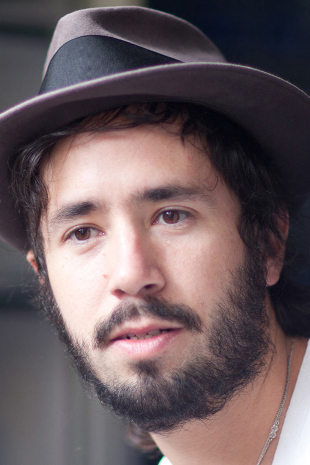Riding a new wave: Mexican cinema comes to the East End Film Festival

Underwater shot from Club Sandwich, showing at Rich Mix as part of the East End Film Festival this month
The uninitiated might find something incongruous about the East End Film Festival having a focus on contemporary Mexican cinema, but it always has been an outward and cosmopolitan affair and not just a chance to check out the latest East London gangster movie.
Luis Buñuel, Guillermo de Toro, Gael García Bernal and Amores Perros are on my most rudimentary of Mexican cinema checklists, but of course this doesn’t begin to scratch the surface. Today, in some quarters, the now hackneyed phrase ‘new wave’ is being rolled out, so this month’s festival will provide film audiences with the chance to see whether it really is a wave,
or just a ripple.
In his hometown of Mexico City, director Sebastian Hofmann is gearing up for an appearance at the festival as its director-in-residence. Last year, Hofmann’s debut feature Halley won the Best Feature Award. It is a tense and surreal film about a man who is lonely because he has a secret – he cannot die. And while he plays out his life working in a gym among well-honed bodies, his own body is rotting away.
“It comes from the fear of having to live inside a body, of being imprisoned in a skin suit and knowing that eventually you will decay and die,” he tells me matter of factly.
The main character, Alberto, Hofmann describes as a “contemporary Frankenstein” – an epilogue filmed in Greenland rams home the allusion – and his life in Mexico City, one of the most populous places on the planet, is a solitary one, dominated by the secret of his immortality and the constant attempts to ‘maintain’ his rotting body.
Hofmann calls his film “a philosophical essay on the body and skin”, though the roots of his filmmaking lie in a childhood spent watching eighties horror movies. Having studied cinema, his tastes are now more refined, and his concerns more about finding new and original forms of expression in film.
“I like it when films surprise me. I watch a lot of great films but they look just like all the great films that I’ve watched in the past, or they look like the great films that have been made for the past 100 years,” he says.
Having won Best Feature for Halley, Hofmann was invited to help curate a selection of films from his home country for this year’s festival. His choice prioritises those directors with a strange and unusual vision.
“One of them is called Malaventura by a friend of mine from Mexico City called Michel Lipkes. It’s a very original look at the old part of Mexico City, which is filled with fantastic characters and locations but also quite dangerous. He did this beautiful portrait of an old man in his last days who lives alone there, in down town Mexico City with all the decadence of the city.”
Hofmann highlights two directors at the festival whose films represent opposing strands in contemporary Mexican film. Diego Quemada’s The Golden Dream (La Jaula de Oro) concerns immigration and is about three teenagers from Guatemala who decide to flee their lives and head to the United States, passing through Mexico. Fernando Eimbcke’s Club Sándwich, meanwhile, is about puberty and separation anxiety as 15-year-old Héctor discovers love and sex while on holiday with his mum.
“Both are completely different filmmakers: one is concerned with the family and family crisis and the other is concerned with social issues and immigration. Mexico is going through really dark times politically and socially. Some explore that, criticising what’s going on using social realism, and other filmmakers have been doing quite the opposite and searching for fantasy or exploring other things. All these original voices are coming out and I think it’s only going to get better.”
Hofmann talks of Mexico as a place of contrasts, where thousands of years of human sacrifices gave way after the Spanish conquest to the rituals of Roman Catholicism. “It became this insane spiritual and religious mess and Mexico still hasn’t quite got over it.” Violence, including lynchings and beheadings, are still known to occur in rural areas. “I think there’s never not been beheadings in Mexico,” he says. “Blood is normal here.”
Halley, though, is a more personal film (“Politics bores me to hell,” Hofmann admits), though it bears the hallmarks of Mexico through the suffering of its main character, the ‘living corpse’ Alberto. “Alberto is stuck here with his suffering and he’s not going to reach heaven. He’s stuck with this middle ground that’s the physical ground and is the witness of his own decay.”
The East End Film Festival focuses on the work of first and second time directors. At such an early stage in their careers, each director will in some respect have faced a fight to get their films made.
Hofmann was lucky enough to convince a private investor to back the film, as well as the Mexican production company Mantarraya, but once it was shot he had to turn to Europe to attract the necessary funds for post-production. He rebounds, however, my suggestion that Mexican filmmakers might have it harder than their European counterparts.
“It’s subjective because my film had special effects and elements that made it a little bit more expensive, even though there’s hardly any dialogue and most of the film is shot inside. But really I think it’s just as hard here as anywhere else.
“You can always make a different kind of film just by grabbing a good digital camera with a microphone, asking some friends to help who are good actors, and then make a human story. You know you don’t have to do something far out.”
Sebastian Hofmann will be part of a Mexican cinema panel held after a screening of Malaventura at Barbican Cinema on 22 June.

